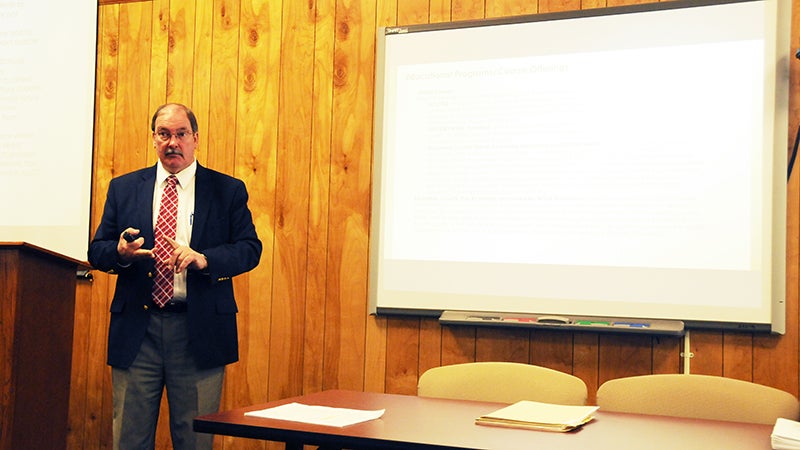School board holds work session on Atmore schools
Published 12:04 am Wednesday, March 27, 2019
Members of the Escambia County Board of Education, Atmore city officials, school principals and others were present March 20 for a work session held at the BOE office in Atmore, where local schools were highlighted.
The purpose of the session was to give city officials, which included Mayor Jim Staff and Councilmen Webb Nall and Chris Walker, an idea of the state of Atmore schools in the Escambia County School System.
Superintendent John Knott, who spoke at length about the three schools here, was asked following the session whether the session was held in response to the Atmore Citizens for Change’s (ACC) efforts to establish a city school system. The city council approved a resolution Monday for a feasibility study to be completed for the proposed school system.
“This is an effort to tell our story, to be able to actually provide some information to the people that are in the city government and to the public,” Knott said. “This is not a meeting about the city of Atmore, and whether it wants to pursue to look into the city system. They have that right. I respect that right. What we’re here for is to make sure they’re fully informed of what we’re doing, where we’ve started and how far we’ve come.”
A variety of topics were discussed at the work session, including the Alabama Accountability Act, the school report card, school programs and funding, to name a few.
During this school year, Escambia County High School was placed on the failing schools list, according to the Alabama Accountability Act of 2015. To be classified as a failing school, students’ standardized test scores on reading and math falls in the bottom 6th percentile of standardized test scores. The test, the ACT Aspire, is used to measure achievement in the 10th grade. The failing schools report, among others, is one of the reasons why the ACC is looking to establish a city school system.
“The accountability act sounds like a way to help students in areas that are struggling,” Knott said. “It sounded great, but in reality, all it did was pull money out of the schools that need the money to be able to make those improvements and make those resources.”
Knott said since the law has been in effect in 2015, $845,000 has been taken out of the school system.
In regard to the school report card, ECHS improved from a “D” grade to a “C.” By comparison, 39 schools earned Fs on the report card, but only 16 of those are labeled as failing under the AAA, according to an AL.com article.
Additionally, ECMS improved from a “D” grade to a “C,” based on the school’s achievement, growth and absenteeism.
“Absenteeism accounts for 15 percent,” Assistant Superintendent Beth Drew said.
According to the AAA’s accountability data for ECMS, the school earned 52 points for achievement, 89 for growth and 16 for absenteeism for the 2017-18 school year.
For ECHS, the school received 33 points for achievement, 84 for growth, 86 for graduation rate, 57 for college and career and 30 for absenteeism.
Rachel Patterson Elementary received a “C” grade in 2017-18 based on achievement, growth and absenteeism.
“The facts to consider are the report card has more elements than just that one test,” Knott said. “The state developed this report card for multiple measures. Since that report card was out, we’re increasing our academic scores and all of the other areas in that report card.
“Last year, we had some demons,” he added. “This year, I’m so thankful for our schools and staff that we’re at a C. Now, is that good enough for us? No. We need to celebrate those successes along the way. We need to celebrate that we’re making improvements.”
Knott spoke on the career technical programs, which are business industry certified, that are offered at ECHS. He said the school has eight programs, and 85 percent of students are enrolled in a career technical program.
The programs include agriscience/formerly building construction; business technology applications; career preparedness; co-op; cosmetology; culinary arts; health science; and welding. For the 2019-20 school year, Coastal Alabama Community College has tentatively scheduled dual enrollment/dual credit for students enrolled in the culinary arts program, he said.






